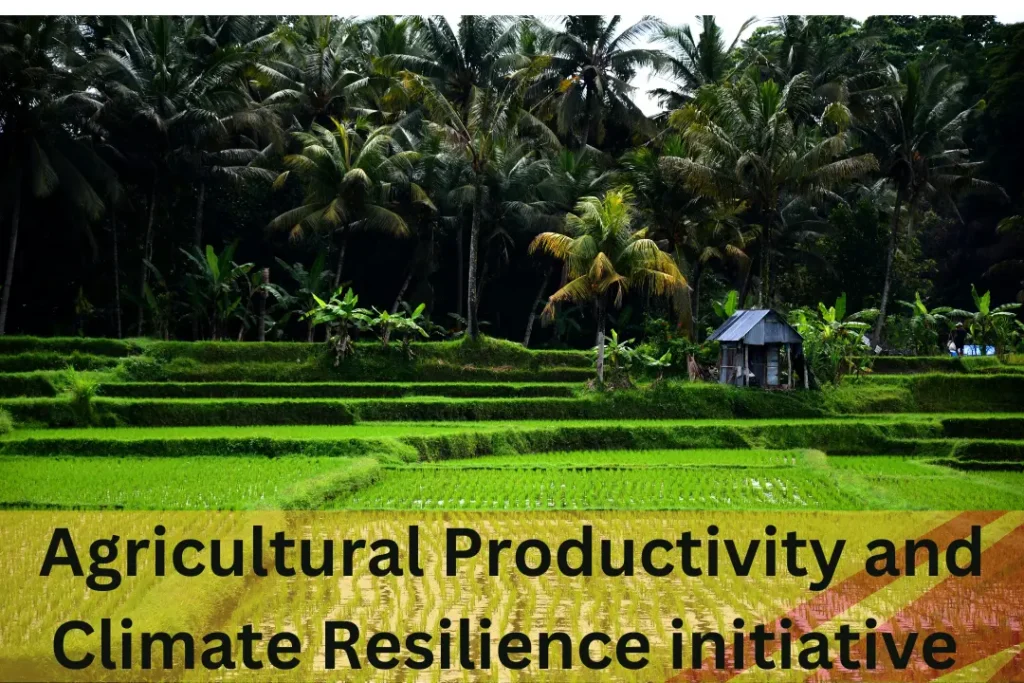
Agricultural Productivity and Climate Resilience initiative 2025
Agricultural still remains the employment generator of over half the Indian population for which keeping the economy afloat is pivotal. However, the erratic climatic patterns for the future are going to pose a serious threat towards the sustainability of this sector specially flooding at critical moments and droughts. Thus, in order to make it more resilient towards such climatic shocks increase agricultural productivity and fruitful use of sustainable practices and technology in agriculture, the Indian government had the Agricultural Productivity and Climate Resilience Initiative.
Table of Contents
Key Objectives of the Agricultural Productivity and Climate Resilience Initiative
The Agricultural Productivity and Climate Resilience Initiative so designed would help to keep Indian agriculture vigorous as well as resilient to changes in climate. Some important objectives are as follows:
1. Increased Agricultural Productivity: Latest era farming practices and research-based application tools that intensify crop output and increase farm productivity.
2. Building Climate Resilience: This is developing climate-resilient agricultural practice withstood not by erratic rains and extreme events.
3. Sustainable Agriculture: Facilitate an activity with lesser environment impact, water, soil health, and chemical inputs.
4. Empowering the Farmer: Provision of resources and training to the farmers for taking climate-resilient agriculture practices and maximum productivity under changing climate conditions.
All these objectives are crucial in the design of a sustainable and climate-resilient agricultural sector supporting food security and economic stability of India.
Productivity and climate resilience strategies:
The program has adopted the following strategies in order to achieve the above. All of these strategies focus on improving the resilience and productivity for impacts of climate threats.
1. Climate resilient crop development
This involves drought-tolerant, flood-tolerant, heat-tolerant among other climatic change tolerant varieties. The seeds were supposed to be high yielding, and the program ought to reduce crop losses and associate this with food insecurity. The new crop varieties are developed under local conditions for an environment so that they should match up the climate-related challenges in various regions of India.
2. Promotion of water-saving practices
Indian agriculture gets significantly impacted by the lack of water, mainly in the drought-prone areas. The new push now promotes the saving of water through drip irrigation and rainwater harvesting as well as efficient irrigation systems that assure the holistic consumptiort of water by farmers for the proper and effective irrigation of crops while conserving this noble resource. The initiative also promotes sensor-based irrigation practices that enhance optimisation in the use of water based on real-time information and hence reduce waste.
3. Taking Up Sustainable Soil Management Practice
Healthy soil is the vital aspect of sustainable agriculture and high productivity. The practice is focused on the health of the soil in terms of crop rotation, organic farming, and low tillage. These would lead to fertile soil, curbing erosion of soils, and lower chemical fertilizers. Furthermore, information relating to the contents of soils is issued to farmers in a soil health card so that they can determine what exactly their land needs specifically.
4. Agriculture extension training and capacity building of farmers need to be improved
This beginning holds the power of success: Training and capacity building for the implementation of new information on climate-resilient techniques and sustainable practices; adapting with environmental conditions can only be brought about by equipping these farmers with such information on what is going on lately around sustainable agriculture and climatic resilience through workshops facilitated and organized by government and site plus digital resources. The training boosts their skills on innovative practices since they will increase productivity.
5. Digital and Precision Agriculture
Satellites, precision agriculture, and other technology initiatives are integral parts of this New India initiative to modernize Indian agriculture. For instance, proper application of satellite-based crop monitoring, soil health mapping, and proper weather forecasting enables farmers to take proper decisions and save losses due to unforeseeable climatic events. Coupling AI with IoT devices in crop management and pest control leads to value addition to productivity and minimizes wastages of resources.
Consequential Effects of the Program and Benefits
The Agricultural Productivity and Climate Resilience Initiative will have enormous benefits to the Indian agricultural sector, rural communities, and at large economic empowerment.
Higher Food Security and Livelihoods
This program raises the productivity of farms directly towards food security whereby the Indian population can adequately respond to the growing needs of its inhabitants toward food. Improved productivity means more income for farmers and, consequently better livelihoods, less poverty in rural areas.
Lesser Vulnerability to Climate Shocks
Climate-resilient practices have made Indian agriculture stronger to adverse climate shocks wherein crop loss is lesser, and farm income is protected. It strengthens the stability of the food production by the country during droughts, floods, or impacts resulting from climate-related disruptions.
Sustainability of Agriculture and Benefits on the Environment
Sustainability through the practice of sound environmental practices will lead to lesser environmental footprint by the sector. By conserving water, improving soil health, and reducing chemical inputs, the program ensures environmental sustainability, improves stability in biodiversity and ecosystems, besides ensuring continuity in land use by future generations.
Empowerment of Rural Communities
The initiative equips the farmers with knowledge, resources, and technology to take proactive steps toward sustainable farming. Improved capacity of the agricultural sector builds the farmer to make them more robust in dealing with environmental challenges, boost productivity, and bring about the nation’s development.
Challenges and Future Prospects
Despite its transformative influence on farming, the Agricultural Productivity and Climate Resilience Initiative poses a series of challenges. Some of them include:
1. Resource Scarcity: Advanced technologies for water conservation and infrastructural development of soils are resource-intensive. Often, resources are scarce in most economically deprived areas.
2. Behavioral Change: Changing the farmer’s behavior through enhancement of climate-resilient agriculture. It often takes time. Further, repeated messages and training to all farmers must be conducted to increase socially desirable behavior relating to best practices adopted in agriculture.
3. Climatic Uncertainty: Climate in history is changing, and its trend over time makes it hard to predict, prepare, and prevent impacts of climate change. It will be well-equipped to effectively address emerging challenges with continued research and evolving adaptation in strategy through the initiative.
Future work will involve upscaling the project through further integration of intricately technologically advanced setups, enhancing cooperation with international bodies involved in climate resilience, and furthering research and development to enhance innovative solutions that could abate future climate shocks.
Conclusion
The Agricultural Productivity and Climate Resilience Initiative is a landmark step toward the security of India’s agricultural sector from climate threats while promoting sustainable farming practices simultaneously. This comprises climate-resilient crops, water conservation, sustainable soil management, farmer training, and digital agriculture initiatives, all of which wonderfully blend into the commitment towards sustainable development and food security presented by India to the global community.
Among all efforts toward making this nation climate-resilient, this initiative will shape the roadmap of the nation toward empowering farmers, increasing productivity, and creating a sustainable future for rural communities in India. It will ensure the food supply and be an example to others in a similar climate situation as India now. This effort is one of great ambition but of even greater need so the Agricultural Productivity and Climate Resilience Initiative is a building block of Indian agricultural policy and an indispensable investment in the country’s future.
Read more: Agricultural Productivity and Climate Resilience initiative 2025Namo Drone Didi Scheme: Empowering Women and Revamping Indian Agriculture
Pradhan Mantri Janjatiya Unnat Gram Abhiyan: Concept and Development of Tribal Development in India






2 thoughts on “Agricultural Productivity and Climate Resilience initiative 2025”